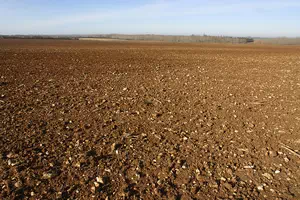|

The U.S. Department of
Agriculture (USDA) regulates the importation of soils for purposes of controlling
biological contaminants (i.e., living organisms like diseases and pests).
The regulation of soil imports (or exports) for other kinds of contamination
(e.g., toxic chemicals) would depend on the soil’s contamination level’s
reaching those regulated by the hazardous and solid waste regulations under Toxic Substances Control Act (TSCA)
or Resource
Conservation and Recovery Act (RCRA).
Soils include mixes of inorganic and organic materials,
when the organic materials are unidentifiable plant and/or animal parts.
This mixture can support biological activity and therefore carry and introduce
harmful pests or diseases. Examples of soil are: Topsoil, forest litter,
wood or plant compost, humus, and earthworm castings.
Imports
Soil from almost all foreign countries (se Canadian
exception below) can move only if conditions and safeguards prescribed
by the U.S. Department of Agriculture, Animal and Plant Health Inspection
Service (APHIS) are met. CFR 330.300 lists the federal authority for these
conditions and safeguards.
At this time, soil from most parts of Canada may be
imported without a permit with the exception of soil from Newfoundland
and the Land District of South Saanich on Vancouver Island, British Columbia,
subject only to inspection and verification of origin.
Permits
for importing soil are required and these are valid for up to five years.
You can apply for a permit using the USDA’s
electronic permit system.
Imported soil must move in leak-proof container that
can withstand shipping. Soil must be treated before disposal or further
use in the U.S. Two treatments are authorized for soil:
(1) Dry
heat at 250 °F. for at least two hours,
(2) Steam heat at the same temperature for 30 minutes
with 15" pressure.
Other treatments and conditions maybe required or
approved such as, destructive analysis, acid washing, irradiation, and
boiling. Under laboratory conditions, small amounts of soil in water may
be flushed into sewage drains, if the water is processed in a tertiary
treatment system, (such as a municipal sewage system).
USDA-APHIS-PPQ offices at some US
ports of entry (Plant Inspection Stations) can perform the treatment at no cost, if certain provisions are met (e.g., must be less
than three pounds). Alternatively, treatment can be performed by one of
numerous commercial, university, and state facilities are
qualified as soil laboratories by USDA-APHIS and may treat any size of
soil shipment. These facilities often charge for their services and will
tell you how to ship your samples to allow movement to their facilities. Also,
a company may become an Approved Soil Laboratory and receive and treat
their shipments.
Exports
There are no restrictions on the export of soils.
More Resources
How
to import foreign soil and how to move soil within the United States. U.S. Department of Agriculture, Animal
and Plant Health Inspection Service Plant Protection and Quarantine.
|
